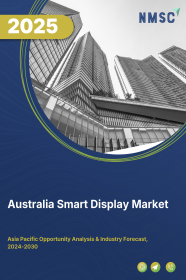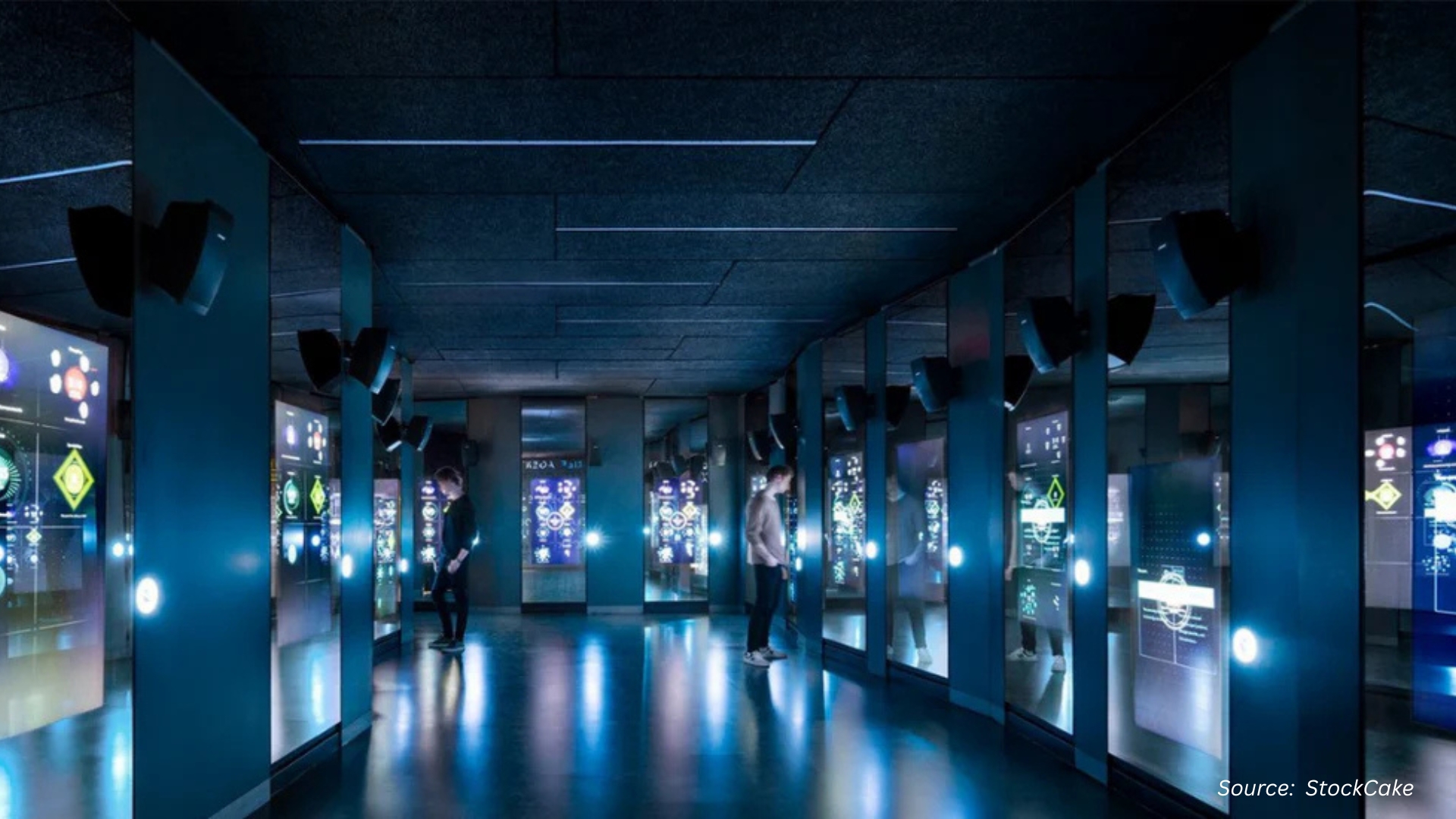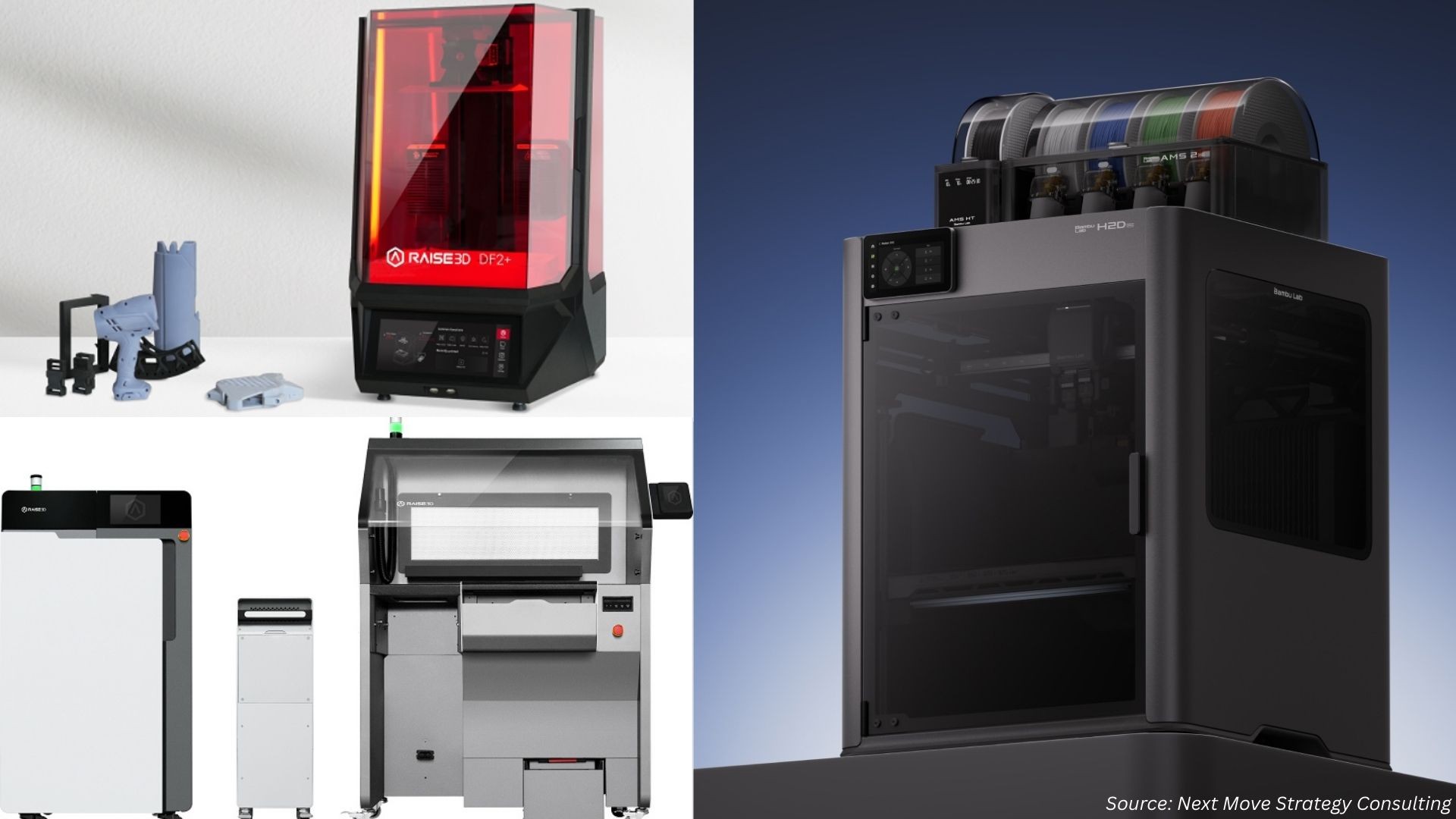
Australia Smart Display Market by Technology (LCD, LED, E-Paper Display, OLED and Others), by Product Type (Standalone Smart Displays, Integrated Smart Displays, Interactive Touchscreen Displays, Transparent Smart Displays, and Other Display Types), by Display Size (Below 24 Inch, 24 Inch to 55 Inch, and Above 55 Inch), by Resolution (UHD, FHD, HD, and Other Resolution) and by Application (Smart Home, Automotive (Smart Mirror), and others)– Opportunity Analysis and Industry Forecast, 2023–2030
Industry: Semiconductor & Electronics | Publish Date: 18-Jul-2025 | No of Pages: 251 | No. of Tables: 206 | No. of Figures: 131 | Format: PDF | Report Code : SE1025
Market Definition
Australia Smart Display Market was valued at USD 360.55 million in 2022, and is predicted to reach USD 1390.4 million by 2030, with a CAGR of 16.8% from 2023 to 2030. A smart display is a sophisticated device featuring a touchscreen or interactive visual interface, coupled with voice recognition and artificial intelligence capabilities.
Functioning as versatile information hubs, these displays can execute diverse tasks, including presenting information and managing smart home devices. They offer visual responses to voice commands, facilitating video calls and serving as interactive tools for scheduling, weather updates, and entertainment purposes.
Smart displays are meticulously crafted to elevate convenience, accessibility, and user engagement across various settings, such as homes, offices, and public spaces. Their applications span residential homes, offices, healthcare facilities, retail, education, and beyond.
Increasing Adoption Of Smart Home Solutions in Australia
The widespread adoption of smart home technologies across Australia is a key driver in the growth of the smart display market. With a strong focus on automation, energy efficiency, and convenience, Australian households are integrating smart displays as control hubs for connected devices including lights, security systems, and climate control. The proliferation of NBN (National Broadband Network) and availability of smart appliances have strengthened this trend, particularly in urban areas. The preference for hands-free, voice-activated systems is also encouraging smart display usage among time-constrained families and tech-savvy individuals.
Growing Integration Of AI and Voice Assistants In Display Devices
The use of AI-driven voice assistants like Google Assistant and Amazon Alexa in smart displays is revolutionizing user interaction in Australia. These technologies enable natural language processing and personalized services that make displays more intuitive and efficient. Smart displays are increasingly used to automate daily routines, provide personalized recommendations, and connect with home systems, especially among younger, tech-adopting demographics. Their growing relevance in areas such as accessibility and aged care also enhances their societal value across the Australian consumer base.
Rising Advancements in the Healthcare and Telemedicine Industry
The rising adoption of smart displays in healthcare and telemedicine drives the smart display market's growth. These devices are proving to be transformative tools in the healthcare industry, as they facilitate remote patient monitoring, telehealth consultations, and efficient communication among medical professionals. Smart displays enable high-quality video conferencing and provide a visual platform for healthcare providers to assess patients, share medical records, and discuss treatment plans in real-time. This adoption is critical in expanding access to healthcare services, especially in remote or underserved areas, and during public health crises like the COVID-19 pandemic. Moreover, integrating AI and medical software into smart displays allows for precise diagnostics and patient data management. As healthcare providers and institutions increasingly recognize the value of smart displays in delivering more effective and accessible healthcare, their use is set to drive the growth of the smart display market in the healthcare and telemedicine sectors. For instance, in March 2023, Samsung Electronics America launched the industry's first 4K QLED Smart Healthcare TV. In partnership with ShareSafe, this innovative product transforms in-room displays into versatile communication hubs personalized for hospital patients and senior care residents, leading to improved collaboration, patient engagement, and workflow efficiency.
Data Privacy and Security Concerns Hinder User Trust
Data privacy and cybersecurity concerns continue to pose significant restraints on smart display adoption in Australia. Consumers are cautious about potential breaches, unauthorized surveillance, and misuse of personal information collected by always-on devices. The Office of the Australian Information Commissioner has flagged growing public concern over how companies manage voice data and facial recognition. This lack of confidence in digital safeguards slows adoption rates, particularly in privacy-sensitive households and sectors like healthcare or education.
Adoption of Next-gen Display Technologies in Public and Commercial Sectors
The Australian market is witnessing growing interest in advanced display formats such as laser-based and microLED smart displays. These technologies offer superior energy efficiency, extended durability, and high-definition visuals—ideal for public signage, educational institutions, and corporate communications. As Australia pushes forward with sustainable infrastructure and smart city initiatives, these displays are well-positioned for integration into public transport hubs, government facilities, and enterprise environments. This shift opens up robust investment potential for both domestic and global display tech providers.
Competitive Landscape
The Australia smart display industry includes several market players such as Amazon, BenQ Corporation, CiscSystems, Inc., Continental, Dell Technologies Inc., DensCorporation, Google LLC, Huawei Technologies Co., Ltd., LenovGroup Ltd., LG Electronics Inc., NEC Corporation (NEC Display Solutions), Panasonic Corporation, Robert Bosch Gmbh, Samsung Electronics Co., Ltd., Sharp Corporation, Signify NV (Philips), SMART Technologies, Sony Corporation, ViewSonic Corporation, Xiaomi Corporation and others.
Key Benefits
-
The Australia smart display market report provides a quantitative analysis of the current market and estimations through 2023-2030 that assists in identifying the prevailing market opportunities to capitalize on.
-
The study comprises a deep dive analysis of the market trend including the current and future trends for depicting the prevalent investment pockets in the market.
-
The information related to key drivers, restraints, and opportunities and their impact on the market is provided in the report.
-
The competitive analysis of the market players along with their market share in the Australia smart display market.
-
The SWOT analysis and Porter’s Five Forces model are elaborated in the study.
-
Value chain analysis in the market study provides a clear picture of the stakeholders’ roles.
Australia Smart Display Market Key Segments
By Technology
-
LCD
-
LED
-
E-Paper Displays
-
OLED
-
Other Display Technologies
By Product Type
-
Standalone Smart Displays
-
Integrated Smart Displays
-
Interactive Touchscreen Displays
-
Transparent Smart Displays
-
Other Display Types
By Display Size
-
Below 24 inch
-
24 inch to 55 inch
-
Above 55 inch
By Resolution
-
UHD (3840 × 2160 or higher)
-
FHD (1920 × 1080)
-
HD (1280 × 720 or 1366 × 768)
-
Other Resolutions (2K, WXGA, Custom)
By Application
-
Smart Home
-
Voice-Controlled / Assistant Smart Display
-
Smart Appliance Display (fridge, oven, HVAC, etc.)
-
Smart Display Mirror – Home
-
-
Automotive (Smart Mirror)
-
OEM Rearview Display Mirror
-
Aftermarket Rearview Display Mirror
-
Side-View Display Mirror
-
-
Digital Signage
-
Retail & Hospitality Signage
-
Transportation Hubs & Public Places Signage
-
Sports & Entertainment Venue Signage
-
Other Signage Applications
-
-
Healthcare
-
Patient Monitoring & Telehealth Displays
-
Diagnostic / Imaging Workflow Displays
-
Digital Whiteboards for Medical Staff
-
-
Automotive (Other In-Vehicle Displays)
-
In-Dashboard Infotainment Displays
-
Digital Instrument Clusters
-
-
Other Consumer/Industrial Applications
Key Players
-
Amazon
-
BenQ Corporation
-
CiscSystems, Inc.
-
Continental
-
Dell Technologies Inc.
-
DensCorporation
-
Google LLC
-
Huawei Technologies Co., Ltd.
-
LenovGroup Ltd.
-
LG Electronics Inc.
-
NEC Corporation (NEC Display Solutions)
-
Panasonic Corporation
-
Robert Bosch Gmbh
-
Samsung Electronics Co., Ltd.
-
Sharp Corporation
-
Signify NV (Philips)
-
SMART Technologies
-
Sony Corporation
-
ViewSonic Corporation
-
Xiaomi Corporation
REPORT SCOPE AND SEGMENTATION:
|
Parameters |
Details |
|
Market Size in 2022 |
USD 360.55 Million |
|
Revenue Forecast in 2030 |
USD 1390.4 Million |
|
Growth Rate |
CAGR of 16.8% from 2023 to 2030 |
|
Analysis Period |
2022–2030 |
|
Base Year Considered |
2022 |
|
Forecast Period |
2023–2030 |
|
Market Size Estimation |
Million (USD) |
|
Growth Factors |
Increasing defense Initiatives. Growing smart technology initiatives. |
|
Companies Profiled |
15 |
|
Market Share |
Available for 10 companies |
|
Customization Scope |
Free customization (equivalent up to 80 working hours of analysts) after purchase. Addition or alteration to country, regional, and segment scope. |
|
Pricing and Purchase Options |
Avail customized purchase options to meet your exact research needs. |




















 Speak to Our Analyst
Speak to Our Analyst

























